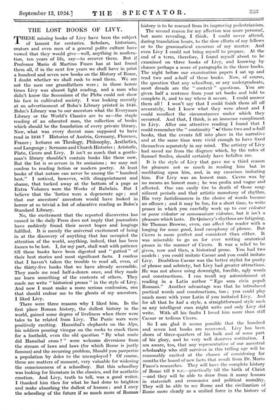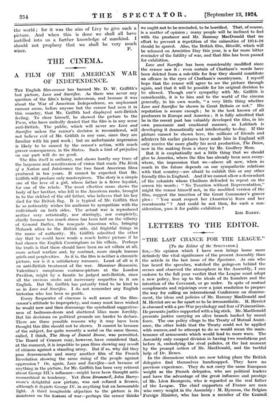THE LOST BOOKS OF LIVY.
THESE missing books of Livy have been the subject of lament for centuries. Scholars, historians, orators and even men of a general polite culture have vowed that they would give—well, anything in modera- tion, ten years of life, say—to recover them. But if Professor Mario di Martino Fusco has at last found them all, if in the next few years we shall have in print a hundred and seven new books on the History of Rome, I doubt whether we shall rush to read them. We are not the men our grandfathers were ; in those heroic times Livy was almost light reading, and a man who didn't know the Secessions of the Plebs could not show his face in cultivated society. I was looking recently at an advertisement of Bohn's Library printed in 1848. Bohn's Library was to our ancestors what the Everyman Library or the World's Classics are to us—the staple reading of an educated man, the collection of books which should be the foundation of every private library. Now, what was every decent man supposed to have read in 1848 ? Histories of Austria, Germany, Florence, France ; lectures on Theology, Philosophy, Aesthetics, and Language ; Sermons and Church Histories ; Aristotle, Plato, .Cicero and Livy. . It isn't so much that a gentle- man's library shouldn't contain books like these now. But the list is so severe in its omissions ; we may not confess to reading fiction or modern poetry. At least books of that nature can never be among the " hundred best." I noticed, however, with disappointment and shame, that tucked away at the bottom of a page as Extra Volumes were the Works of Rabelais. But I believe that the 'forties were a degenerate age ; and that our ancestors' ancestors would have looked in horror at so trivial a list of educative reading as Bohn's Standard Library.
No, the excitement that the reported discoveries has caused in the daily Press does not imply that journalists have suddenly found their secret hopes and longings fulfilled. It is merely the universal excitement of being in at the discovery of anything that has occupied the attention of the world, anything, indeed, that has been known to be lost. I, for my part, shall wait with patience ,till these books have been digested and " gutted " of their best stories and most significant facts. I confess that I haven't taken the trouble to read all, even, of the thirty-five books that we have already accessible. They made me read half-a-dozen once, and they made me learn something of the contents of others. They made me write "historical proses " in the style of Livy. And now I must make a more serious confession, one that should endear me to the ghosts of my ancestors. I liked Livy.
There were three reasons why I liked him. In the first place Roman history, the dullest history in the world, gained some degree of liveliness when there were tales to be related from Livy. The Punic wars were positively exciting. Hannibal's elephants on the Alps, his soldiers pouring vinegar on the rocks to crack them for a foothold, even the old question " By what route did Hannibal cross ? " were welcome diversions from the stream of laws and laws (for which Rome is justly famous) and the recurring problem, Should you pauperize a population by doles to the unemployed ? Of course, these are matters of moment, very valuable for widening the consciousness of a schoolboy. But this schoolboy was looking for literature in the classics, and for aesthetic emotion. And Livy, truth to tell, was a good writer. I thanked him then for what he had done to brighten and make absorbing the dullest of lessons ; and I envy the schoolboy of the future if so much more of Roman history is to be rescued from its improving pedestrianism. The second reason for my affection was more personal, but more revealing, I think. I could never attend, during translation hours, to the slow efforts of my fellows or to the graminatical'excursus of my master. And even Livy I could not bring myself to prepare. At the end of a term, therefore, I found myself about to be examined on three books of Livy, and knowing by chance perhaps a score of paragraphs in the three books. The night before our examination papers I sat up and read two and a-half of those books. Now, of course, the question that any schoolboy, or any undergraduate, most dreads are the " context " questions. You are given half a sentence from your set books and told to complete it, and to say where it occurs. I could answer them all ! I won't say that I could finish them all off accurately, but I knew what they were about and I could recollect the circumstances under which they occurred. And that, I think, is an immense compliment to Livy. After one attentive reading I found that I could remember the " continuity " 4f those two and a-half books, that the events fell into place in the narrative and at the same time were vivid enough to have fixed themselves separately in my mind. The artistry of Livy had saved me from the disgrace which, by the rules of Samuel Smiles, should certainly have befallen me.
It is the style of Livy that gave me a third reason for pleasure not so much in reading him but in meditating upon him, and, in my exercises imitating him. For Livy was an honest man. Cicero was by no means an honest man ; he was prolix and vague and affected. One can easily tire to death of those mag- nificent periods and that artistic monotony of rhythm. His very fastidiousness in the choice of words became an offence ; and it may be fun, for a short time, to write proses in which you carefully work up to esse videatur or posse videatur or communicare videatur, but it isn't a pleasure which lasts. De Quincey's rhythms are fatiguing. Sir Thomas Browne, even, can affect the reader with a longing for some good, loud cacophony of phrase. But Cicero is more perfect and consistent than either. It was miserable to go on for ever writing oratorical proses in the manner of Cicero. It was a relief to be given, now and then, a historical prose. You had two models : you could imitate Caesar and you could imitate Livy. Doubtless Caesar was the better stylist for purity of phrase and sobriety, but Livy had greater attractions. He was not above using downright, forcible, ugly words and constructions. I can recall my astonishment at reading in a Latin author " Ego sum civis populi Romani." Another advantage was that he introduced poetical words and constructions, too ; you could play much more with your Latin if you imitated Livy. And for all that he had a style, a straightforward style such as any intelligent man might write and only Livy did write. With all his faults I loved him more than stiff Caesar or tedious Cicero.
So I am glad it seems possible that the hundred and seven lost books are recovered. Livy has been shorn of three-quarters of his bulk and of some part of his glory, and he very well deserves restitution. I am aware, too, that any representative of our ancestral scholarship who still survives in this trifling age will be reasonably excited at the chance of considering for months the hoard of new facts that result from Dr. Mario Fusco's researches. They will have the complete history of Rome till 9 n.c.—practically till the birth of Christ —and they will be able to draw from it many lessons in statecraft and economics and political morality.
They will be able to see Rome and the civilization of Rome more clearly as a unified force in the history of the world ; for it was the aim of Livy to give such a picture. And when this is done we shall all have instilled into us a further knowledge of mankind. I should not prophesy that we shall be very much



































 Previous page
Previous page